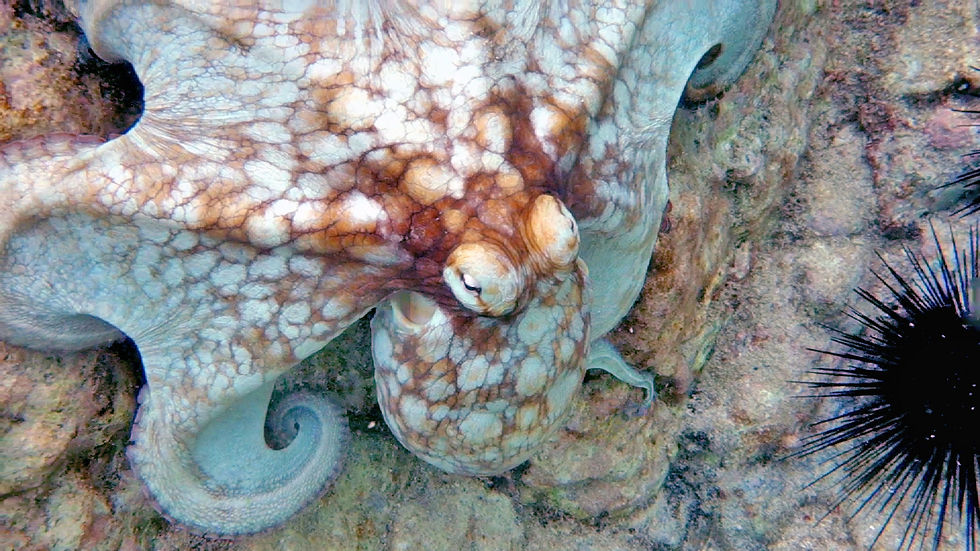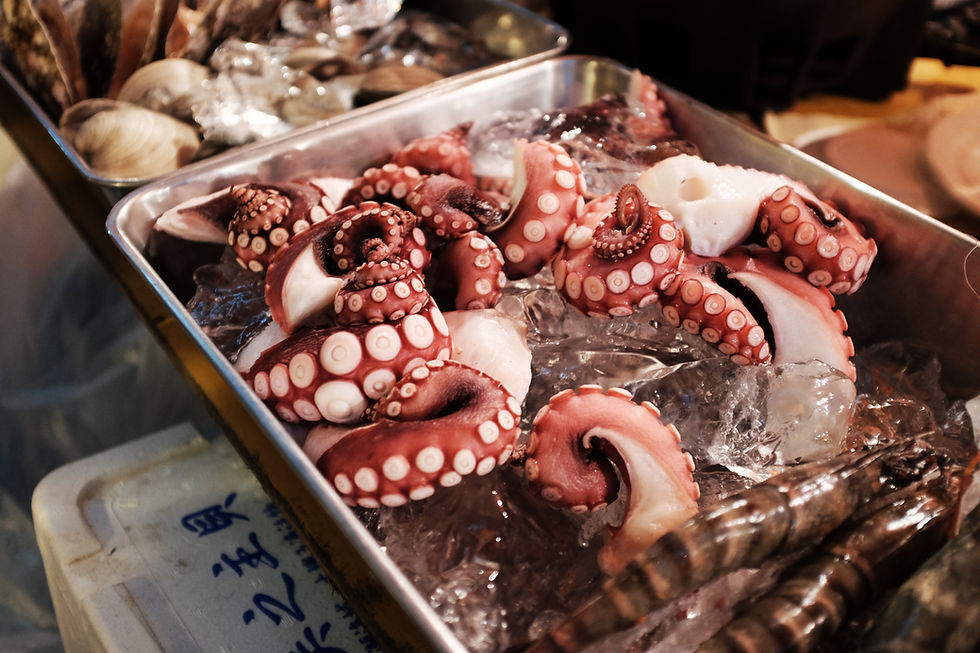How will the Government respond to the world's first ever octopus factory farm? With cephalopods recently added to the Animal Welfare (Sentience) Bill, will they take meaningful action and prevent farmed imports into the UK before the industry takes root?
By Kate Fox
Published in the Oceanographic magazine (external link)

What are the welfare concerns of octopus factory farming?
It has taken researchers nearly 70 years (1) to make octopus yield to the misery of factory farming but their “success” comes at a price. While Nueva Pescanova, the multinational company behind the first octopus factory are being secretive about the details, some facts are filtering through. Rather disturbingly, it appears that their octopus survival rates are “estimated to rise to 50%.” Put another way, this means more than 50% of octopus are dying which implies significant suffering. (6)
Stress is an inevitable consequence of farming intelligent and sensitive animals like octopus. Their sensitive nature means they prefer a solitary existence but put them in small individual tanks bereft of intellectual stimulation and they could self-mutilate. Alternatively, forcing them into large-scale commercial operations with shared accommodation and they are likely to turn to cannibalism. Octopus caught together in traps are often found with missing limbs. (3). In a world with so many food choices, commercially farming wildlife is undoubtedly unnecessary, but it is also fraught with knowledge gaps that can lead to untold cruelty. Unlike humans, octopuses have an unusual decentralised nervous system. This limits our understanding of how to relieve pain in octopus. (3) Of course, the lack of trained vets is another significant welfare concern as factory farming is fraught with illness and injury due to high stocking densities in unnatural surroundings.

Are octopus sentient?
Sentience is a term often banded around but it's not always clear what it means. Put briefly, it’s the ability to physically feel sensations, emotionally respond to them and learn from these experiences. This means that if an animal can feel pain and is scared about having pain inflicted upon them, it has significant welfare implications for farming.
It's not often that we get to see sentience up close in wild animals but Craig Foster's recent documentary "My Octopus Teacher" leaves the viewer in no doubt that octopus are sentient.
When attacked by a shark, it was clear that the starring octopus felt pain. Not only was she physically traumatised, but she was drained of colour and the fear of future attacks led to intense mental strategising. Incredible footage of her wrapping herself in kelp and shells to hide, crawling across land and even riding a shark’s back to avoid being located and captured.
For those that need more empirical data, London School of Economics “Review of the Evidence of Sentience in Cephalopod and Decapod Crustaceans” concluded that “there is very strong evidence of sentience in octopods.”
They conclude “that high-welfare octopus farming is impossible” and recommend the UK government that octopus “be regarded as sentient animals for the purposes of UK animal welfare law” (3) and that “the government may wish to consider a ban on imported farmed octopus.”

Why do you think octopus are being targeted for farming?
Large-scale cephalopod fisheries are virtually unregulated (5) and octopus catches have almost doubled between 1980-2014. The result? Octopus have become more scarce with prices shooting up from $2.2 to $11.6 per kg between 2000 and 2018. That’s a whopping 426% increase in 18 years! (5) This situation has created both a dilemma and an opportunity for Nueva Pescanova. While the growing scarcity of wild octopus is clearly a problem for their €905 million turnover (6), it has also helped create a luxury food item. With ready-made powerful supply chains, trade routes and loyal customers that could be easily transferred to farmed octopus, it’s easy to understand why this ethical travesty is happening.
Unfortunately, an octopus's short life-span and ability to produce large amounts of offspring make them an even more appealing candidate.

Why would octopus farming be unsustainable?
Farming carnivores to supply human food is logically bereft. It is not only inefficient but threatens biodiversity, food security and food equality.
Imagine drawing a food chain. The longer it becomes, the less efficient it gets with up to 90% of the energy wasted at every trophic level. Farming long food chains basically means more biodiversity is lost at every stage. The solution is simple. The closer we can get to eating ‘producers,’ the more energy efficient our food chain becomes.
Apart from the inefficiency of eating carnivores, farming them hides a further layer of threat. It is obviously disturbing that we are killing animals to feed to another animal that we would rather eat. We are presently filtering 20% of the fish we catch into producing fishmeal so that we can feed captive carnivores. Farming octopus will obviously add to this burden.
Octopus have a food conversion ratio of 3:1 (1) which means they need to be fed three times their end bodyweight in wild-caught fish. With 90% of our fish stocks overexploited, fully exploited or depleted, can we really afford to threaten our biodiversity further by farming octopus? (8)

Could octopus farming stabilise the growing demand for wild caught octopus?
Farming might seem like a logical conservation tool, but it doesn’t always work as fuelling the supply of something can actually boost demand.
For example, farming bears for bile was introduced to support a growing demand for Traditional Medicine and protect wild bears from poaching. Instead of satisfying demand, it inflamed it. Bile was then marketed as a cure for everything from acne to hangovers and is now used in shampoo, toothpaste and tea. The impact has been devastating for wild bears.
There is a strong possibility that farming octopus could incentivise wild octopus demand. This threat cannot be underestimated, as humanity rarely does things on a small scale.
If one takes into account that Nueva Pescanova's €905 million turnover can fund influential marketing campaigns, the risk of this happening is even greater. They have already received an award from The Luxury Advertising Awards Organization for a campaign called "less gossip, more octopus" in 2017.

Is farming octopus socially ethical?
Fishmeal fisheries that would be used to feed captive octopus are based in some of the more impoverished regions of the global south where people potentially rely on fish for survival. This not only threatens their food security, but also food equality (1). It is hard to justify fuelling luxury food markets of farmed octopus against such ethical concerns.

Can octopus be killed "humanely"?
Well, taking another life is clearly never humane but if it can be done without inflicting pain, then the answer is no. The nervous system of an octopus makes it impossible to kill them without an overdose of anaesthetic but this renders them inedible. (3). The London School of Economics Review actually doesn’t recommend any existing methods which include “clubbing, slicing the brain, reversing the mantle and asphyxiation.”

Why ban octopus farming imports when it doesn't exist?
The first octopus farm won't open until 2023 and this makes it the perfect time to act. It’s not often that UK politicians get to make a significant impact with little effort. Once Nueva Pescanova opens the first octopus farm, the government will have lost their advantage and will be battling with scientists, conservationists and animal advocacy groups for decades. As an organisation, we try to unite the broad spectrum of animal protecting communities but this is not always as easy as it sounds. However, octopus farming transgresses so many issues that it creates a lot of common ground. Everything from animal advocacy, conservation, biodiversity loss, food insecurity and food inequality. Unsurprisingly, the news of the first commercial octopus farm, which is predicted to open in 2023 (6), is beginning to draw a lot of negative press. As octopus have recently been added to the UK’s Animal Welfare (Sentience) Bill, (2) it also gives the government an amazing opportunity to take relevant and meaningful action. Put simply, it is a rare moment in history to pick some very low-hanging political fruit!

What makes octopus so remarkable?
If awe and wonder is what you love about nature, octopus won’t disappoint you. Let’s start with their 3 hearts and blue blood. While one heart pumps blood around the body, the other two focus on oxygen uptake around the gills. And instead of iron-based haemoglobin, their blood has copper-based haemocyanin, giving it that definitive blue colour enabling it to carry oxygen at lower temperatures. Their nine brains are equally as fascinating. Craig Foster, from ‘My Octopus Teacher,’ when talking about his beloved octopus, explains that “two-thirds of her cognition is outside her brain in her arms.” Once you know they’ve 180 million neurons in their brain, and 320 million neurons divided between their arms, this begins to make more sense. (9). Their intelligence is nothing short of incredible. The number and complexity of strategies they use to evade predators and the speed at which they employ them in life and death situations is breath-taking. Octopus are also semelparous which means they reproduce just once in their life-time. Reproduction is also the moment they die. Foster, in the midst of his grief, marvels at how the octopus featured in his documentary is “timing her death exactly for the hatching of those eggs.”
Three hearts, one cause: block octopus factory farming!
Below are links to on-going petitions to prevent octopus factory farming. Please consider 'inking' your signature on all of them!
(Please note these are external links).


Comments